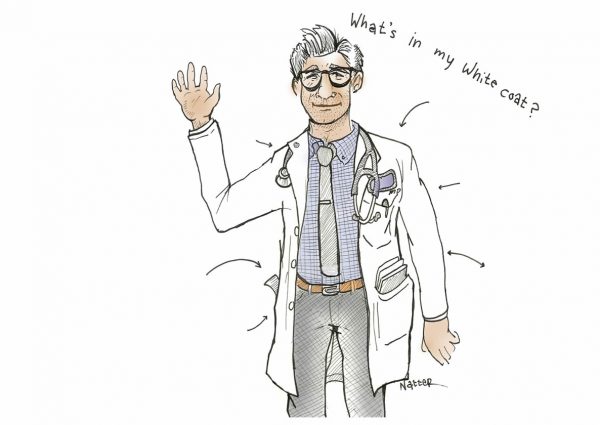This week’s guest post is written by Wil Berry, MD, a resident in psychiatry at NYU Langone Medical Center.
My patient, sporting a surprisingly fresh-looking plaid shirt, is sitting at a table in a courtroom on the 19th floor of Bellevue hospital. His hair, in the midst of a transition from sandy brown to silver, falls over his ears but is combed cleanly back to reveal friendly blue eyes. His beard, no longer grimy and tangled, is the color of concrete and full enough to obscure most of his tanned neck. He has been waiting for this moment for most of two weeks, as he has been telling me daily during our fruitless visits, and his posture is stiff with anticipation. I watch him shift his weight form one laces-free sneaker to another, his weathered face showing a softly confident smile, and realize that he looks both profoundly crazy and absolutely not dangerous. And I think, We are definitely going to lose.
The judge comes in, looking at no one, and Mental Health Court is in session. The tone of the regular participants — judge, attorneys, clerk — is flat and uninterested, a contrast to my patient’s jittery energy that makes him seem like a five-year-old at his father’s boring office party. When the clerk tries to swear my patient to tell the truth, he interrupts her to tell her that he can’t swear on a Catholic Bible because he knows the church’s secrets and they are after him. She assures him that he need not swear on any Bible, and he agrees to tell the truth adding “…so help me Christian God, Jewish God, and all gods of the earth.”
The attending psychiatrist, my supervisor on the case, speaks first. He says that my patient is psychotic and unable to care for himself, that he has no place to live and has refused to take medication. He says that he is worried that if my patient is released from the hospital in his current state, something bad will happen to him. When he is asked if my patient has been hospitalized before, he replies that our hospital records show thirty-six hospitalizations. In response my patient stands, puts both hands on the table, and says, “Doctor, sir, that is a lie, I have been hospitalized over seventy times!” The judge asks my patient politely to sit down and wait for his turn to speak, and I can see his court-appointed attorney tugging the sleeve at his elbow. He sits, re-composed, saying gently “I’m sorry your honor.”
My patient speaks with the unwavering sincerity of a fanatic, his cult composed of his own delusions, his faith reinforced by the doubting psychiatrists who try to diagnose and medicate him. When I first met him, the morning after he had been brought to the emergency room for trying to direct traffic in the center of a busy intersection, I offered him my hand. “Thanks Doc but you don’t want to shake my hand,” he said, his voice relaxed and clear. “I just masturbated about twenty minutes ago. My body’s rejecting that chicken they gave us last night.” As he stands now, answering questions in that same voice, eye contact warmly fixed on the judge, his demeanor and plaid shirt give him an air of both professionalism and small-town charm.
“Do you intend to hurt yourself?”
“No sir, your honor, absolutely not.”
“Do you intend to hurt anyone else?”
“No sir, your honor, absolutely not.”
Both parties have fallen into a rhythm, speaking their parts from memory. I wonder if perhaps my patient has spent more time in court than the boyish, court-appointed attorney at his side.
“And what will you do if you are released from this hospital?” Only now does the judge look at him, sliding his glasses down his nose and peering down from the bench.
My patient extends a finger towards the back of the courtroom, the nail long but clean; he is pointing east, to FDR Drive and the water beyond, to the grand and unfulfilled freedom of his future, and the pitch of his voice rises at the thought of it. “I am going to get a boat, your honor. I will be the captain. And I am going to clean up that dirty river.”
Afterwards, in a hallway behind the elevator bank, my supervisor asks me why I think we lost. I tell him that I think our patient may have invoked a powerful American archetype, that of the harmless madman, a free-traveling, gray-bearded, hobo-esque schizophrenic who lives by his own code and prizes liberation above all else. I speculate that this symbol is essential to the narrative of our country, of our cities, and of the persistent presence of the seriously mentally ill living among us on our streets. I offer that perhaps it is a symbol which resonated with the court. He tells me that we just got stuck with a bad judge.
While my patient is packing up his room I go and see him to tell him goodbye and wish him well. I offer to see him next week for a follow-up appointment, which I assure him will not take place on the locked ward. He puts the appointment card in the pocket of his wool pants and tells me that he would like to come but doubts he will be available. He smiles at me and tells me that he has enjoyed our conversations. Later that day I sit at my desk, typing up notes and putting in lab orders for the next morning. The window to my right is bolted shut and reinforced with a wire safety guard but if I sit up straight I can see the city stretching southward, lights becoming visible as the sun begins to set. The river is to the east, bridges brimming with evening traffic, the water dark as a shadow between the boroughs, and I watch as a few boats make their way slowly southwards, moving out to sea.








